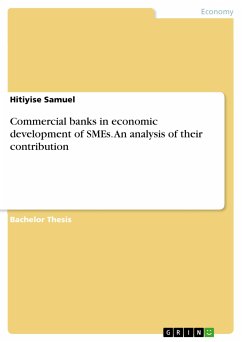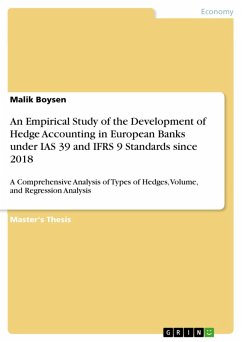Bachelor Thesis from the year 2021 in the subject Business economics - Investment and Finance, grade: second class upper division, , course: Accounting, language: English, abstract: The study was guided by analyzing the contribution of commercial banks in economic development of SMEs The target population for the study consisted of registered SMEs in KCBR as their clients.A descriptive research design as well as an explanatory research design was used. The study used Bouchard formula to sample SMEs and then used random sampling to select the 105 SMEs. The respondents of the study were the owners and managers of the SMEs. The study used questionnaires to collect quantitative data using closed ended questions . Data analysis will be done using SPSS statistical software version 21. Descriptive statistics (Frequencies, Means and Standard deviation) and inferential statistics (Correlations and regression) were used in analysis. A multiple linear regression model was used for analysis and all tests were conducted at 5% level of significance. The study findings indicated that banking services are positively related with economic development of SMEs. The study concluded that commercial banks in Nyarugenge district are favorable. The study also concluded commercial bank services are effective and they economic development of SMEs significantly. SMEs in Rwanda suffer from weak financial performance and a high failure rate. Scholars argue that judging by the poor economic development of the informal sector, not much progress seems to have been achieved, despite government efforts to promote SME activity. Some of the key factors attributed to this poor performance is access to financial services. Therefore, the purpose of this study was to examine the contribution of commercial banks in economic development of SMEs Normally, SMES play vital and significant contributors to economic development through their critical role in providing job opportunities and reducing poverty levels, an estimated number of up to 40% of the start-ups SMEs fail by year 2 and at least 60% close their doors by year 4. This menace is attributed to poor financial management among small businesses. Accessing credit is a major constraint to the economic development and growth of SMEs and also to poor rural and urban households. This is mainly due to the behavior of lenders in terms of hedging against borrowers' risks by demanding collateral, which they lack, and also information asymmetry.
Dieser Download kann aus rechtlichen Gründen nur mit Rechnungsadresse in A, B, BG, CY, CZ, D, DK, EW, E, FIN, F, GR, HR, H, IRL, I, LT, L, LR, M, NL, PL, P, R, S, SLO, SK ausgeliefert werden.









